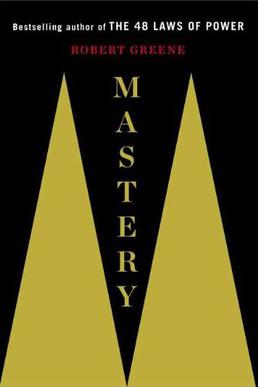Mastery (book)
Mastery is a book written by American author Robert Greene, published in 2012. The book is a self-help guide that offers advice on how to achieve mastery in one's life and career. Drawing upon historical examples and the lives of significant individuals, Greene outlines the paths that lead to mastery and the essential strategies for achieving it.
Synopsis[edit | edit source]
Mastery delves into the lives and careers of historical figures and contemporary masters to illustrate Greene's thesis that mastery is achieved through a combination of innate talent, dedicated time to one's craft, and a deep understanding of people and environments. The book is divided into sections that explore the various phases and strategies for achieving mastery, including the importance of finding one's life's task, the apprenticeship phase, the value of mentors, social intelligence, and the creative-active phase.
Key Concepts[edit | edit source]
- Life's Task: Greene emphasizes the importance of discovering one's unique calling or vocation, which he terms the "Life's Task." This discovery is crucial for setting the foundation on the path to mastery.
- The Apprenticeship Phase: A period of intense learning and observation, where the individual acquires skills and gains knowledge in their chosen field.
- Mentor Dynamics: The role of mentors in providing guidance, knowledge, and shortcuts to mastery. Greene discusses how to choose the right mentors and the best ways to learn from them.
- Social Intelligence: The ability to navigate social environments and handle social situations effectively is highlighted as a critical component of achieving mastery.
- The Creative-Active Phase: Greene describes this phase as the point where the individual has internalized their skills and knowledge to the extent that they can begin producing original work and contributing innovations in their field.
Reception[edit | edit source]
Mastery has received a positive reception from readers and critics alike, praised for its in-depth research and practical advice. However, some critics have noted that the book's prescriptions require a level of dedication and time investment that may not be feasible for everyone.
Influence[edit | edit source]
The book has influenced a wide range of individuals, from entrepreneurs to artists, encouraging them to pursue their passions and dedicate themselves to the pursuit of mastery in their fields. It has also been used in various educational and professional development contexts as a tool for understanding the path to excellence and success.
See Also[edit | edit source]
Search WikiMD
Ad.Tired of being Overweight? Try W8MD's physician weight loss program.
Semaglutide (Ozempic / Wegovy and Tirzepatide (Mounjaro / Zepbound) available.
Advertise on WikiMD
|
WikiMD's Wellness Encyclopedia |
| Let Food Be Thy Medicine Medicine Thy Food - Hippocrates |
Translate this page: - East Asian
中文,
日本,
한국어,
South Asian
हिन्दी,
தமிழ்,
తెలుగు,
Urdu,
ಕನ್ನಡ,
Southeast Asian
Indonesian,
Vietnamese,
Thai,
မြန်မာဘာသာ,
বাংলা
European
español,
Deutsch,
français,
Greek,
português do Brasil,
polski,
română,
русский,
Nederlands,
norsk,
svenska,
suomi,
Italian
Middle Eastern & African
عربى,
Turkish,
Persian,
Hebrew,
Afrikaans,
isiZulu,
Kiswahili,
Other
Bulgarian,
Hungarian,
Czech,
Swedish,
മലയാളം,
मराठी,
ਪੰਜਾਬੀ,
ગુજરાતી,
Portuguese,
Ukrainian
Medical Disclaimer: WikiMD is not a substitute for professional medical advice. The information on WikiMD is provided as an information resource only, may be incorrect, outdated or misleading, and is not to be used or relied on for any diagnostic or treatment purposes. Please consult your health care provider before making any healthcare decisions or for guidance about a specific medical condition. WikiMD expressly disclaims responsibility, and shall have no liability, for any damages, loss, injury, or liability whatsoever suffered as a result of your reliance on the information contained in this site. By visiting this site you agree to the foregoing terms and conditions, which may from time to time be changed or supplemented by WikiMD. If you do not agree to the foregoing terms and conditions, you should not enter or use this site. See full disclaimer.
Credits:Most images are courtesy of Wikimedia commons, and templates Wikipedia, licensed under CC BY SA or similar.
Contributors: Prab R. Tumpati, MD

